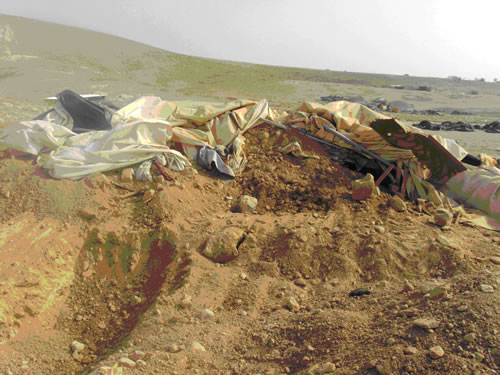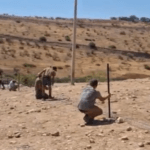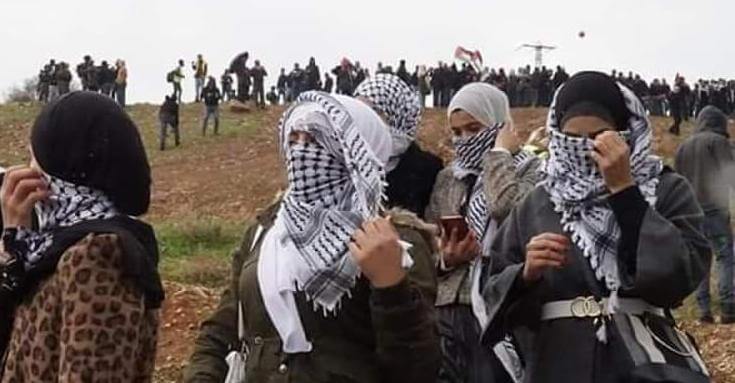The occupation forces demolish 3 animal shelters in Al Farisiya

One year ago, in July and August 2010, Israeli bulldozers demolished almost the all village of Al Farisiya, twice.
Today the bulldozers came back and demolished homes again.
This is just the latest in Israeli’s repeated attempts to destroy the village of Al Farisiya, in the heart of the Jordan Valley, through demolitions of homes and animal shelters, destruction of water pipes, confiscation of water pumps and tractors, and felling of trees.
For previous reports by Jordan Valley Solidarity see: http://www.jordanvalleysolidarity.org
Al Farsya is surrounded by 5 settlements, and the life of its communities is based on their lifestock.
Again, this shows the Israeli policy of ethnic cleasning of the Jordan Valley, and comes in the wake of appalling revelations in Haaretz (an Israeli daily newspaper) of Israel’s plans to transfer bedouins into state created and controlled ‘reserves’ or ‘townships’ .
Amnesty International have issued an urgent call for action against Israel’s further destruction of this community:
UA: 297/11 Index: MDE 15/036/2011 Israel and the Occupied Palestinian Territories
Date: 5 October 2011
URGENT ACTION
Palestinian properties at risk of demolition
On 18 September, the Israeli military served three “stop work” orders against four domestic structures belonging to three Palestinian Bedouin families in the Tubas district in the occupied West Bank. These orders precede demolition orders, so the properties could be destroyed at any time. The villages are in “Area C” where the Israeli authorities effectively prohibit any Palestinian construction.
The orders were given in Tell al-Himma and al-Farisiya villages, in the Tubas district in the occupied West Bank. They were issued because the families lack permits to build, despite the structures already being fully built.
In al-Farisiya, a “stop work” order was issued against an animal shelter belonging to Saleh Abu Amer’s family. This affects six people, including two children. In Tell al-Himma, the structures include two for livestock (one belonging to Ghaleb Fuqha and one to Mahmoud Ayoub) and a third used for meetings and social occasions belonging also to Mahmoud Ayoub. In total, 13 people including nine children are affected. The structures in Tell al-Himma were reportedly donated by the UN Food and Agricultural Organization (FAO) three years ago.
Ghaleb Fuqha has dismantled his animal shelter, stating his fears “if they … demolish this now then my home will be next.” His herd of 50 sheep are likely to suffer as they cannot shelter from the harsh sun or the winter to come.
The two villages are in Area C, which makes up 60% of occupied West Bank. In this area, the construction of homes and other structures is effectively prohibited. Applications to build are invariably turned-down as the land is mostly designated for Israeli settlements, illegal under international law, or for Israeli military zones.
The UN Office for the Coordination of Humanitarian Affairs in the occupied Palestinian territory (OCHA) states that since July 2010, the Israeli authorities have destroyed 117 structures including homes in al-Farisiya. This has led to the displacement of 129 people, including 63 children.
Please write immediately in English, Hebrew or your own language:
- Urging the Israeli authorities to ensure that the ”stop work” orders in Tell al-Himma and al- Farisiya are immediately withdrawn and express concern that the destruction of the properties would pose a serious threat to the livelihoods of the families;
- Calling on the authorities to place an immediate moratorium on house demolitions and forced evictions in the West Bank and to review its housing policy and issuance of construction permits in accordance with the UN Human Rights Committee’s recommendations.
PLEASE SEND APPEALS BEFORE 16 NOVEMBER 2011 TO:
Minister of Defence
Ehud Barak
Ministry of Defence
37 Kaplan Street, Hakirya
Tel Aviv 61909, Israel
Fax: +972 3 6916940/6962757
Email: minister@mod.gov.il
Salutation: Dear Minister
Military Judge Advocate General
Major General Avihai Mandelblit
6 David Elazar Street
Hakirya, Tel Aviv, Israel
Fax: +972 3 569 4526
Email: avimn@idf.gov.il
Salutation: Dear Judge Advocate General
IDF Chief of Staff
Lieutenant-General Benny Gantz
c/o Ministry of Defence
7 A’ Street,
Hakirya, Tel Aviv, Israel
Fax: +972 3 6916940/6976218
Salutation: Dear Lieutenant-General
Also send copies to diplomatic representatives accredited to your country.
Please check with your section office if sending appeals after the above date.
URGENT ACTION
Palestinian properties at risk of demolition
Additional Information
local council official told Amnesty International that no demolitions have taken place in Tel al-Himma since 1989, when the Israeli army demolished a brick house. In Tel al-Himma, land is registered as private property in contrast to most land in the Occupied Palestinian Territories (OPT) which was declared (Israeli) state land as a result of the historical trend dating back to the Ottoman period whereby residents have tended not to register land.
On 6 August 2010 Amnesty International issued an urgent action on behalf of 92 Palestinians from the village of Hmayyir, in the al-Farisiya area, whose homes had been demolished the previous day. During the demolition 27 tents serving as homes and 10 other properties used for agricultural purposes were destroyed. These tents had only just been erected after they were donated to the families by a humanitarian organization and the Palestinian Authority’s Ministry of Local Government as an emergency measure, because the Israeli army had destroyed 74 properties, including homes, in the previous month affecting over 100 people.
Tubas lies within the 60 per cent of the West Bank designated as “Area C”, which is completely under Israeli control. Palestinians living there face recurrent destruction of their property and severe restrictions on building. The Palestinian population in the Jordan Valley, who have lived there since long before the Israeli army occupied the West Bank in 1967, has consistently faced discriminatory Israeli policies relating to planning, building, and access to land and water, and has suffered particular pressure as some of the region’s most poor and vulnerable people. The inhabitants of the Tubas region, like many Palestinians in the Jordan Valley and the occupied West Bank, live each day under the threat of forcible eviction from their homes and land by the Israeli army. They are also subject to restrictions on their movement.
On 29 July 2010, the UN Human Rights Committee issued its observations following its consideration of Israel’s report on its implementation of its obligations under the International Covenant on Civil and Political Rights, to which Israel is a state party. The Committee expressed concern at Israel’s “frequent administrative demolition of property, homes, as well as schools in the West Bank and East Jerusalem due to the absence of construction permits, their issuance being frequently denied to Palestinians… [and] discriminatory municipal planning systems, in particular in “area C” of the West Bank, as well as East Jerusalem, disproportionately favouring the Jewish population of these areas”. It called on the Israeli authorities to “further review its housing policy and issuance of construction permits with a view to implementing the principle of non-discrimination regarding minorities, in particular Palestinians” (Ref: CCPR/C/ISR/CO/3, see http://www2.ohchr.org/english/bodies/hrc/docs/CCPR.C.ISR.CO.3.doc).
Name: Saleh Abu Amer, Ghaleb Fuqha and Mahmoud Ayoub’s families (3 Bedouin families)
Gender m/f: both
UA: 297/11 Index: MDE 15/036/2011 Issue Date: 5 October 2011
————————————-
East Mediterranean Team
Amnesty International, International Secretariat
Peter Benenson House, 1 Easton Street
London WC1X 0DW
United Kingdom
E-mail: Eastmed@amnesty.org
Tel: +44 (0)20 7413 5500
Fax: +44 (0)20 7413 5719





